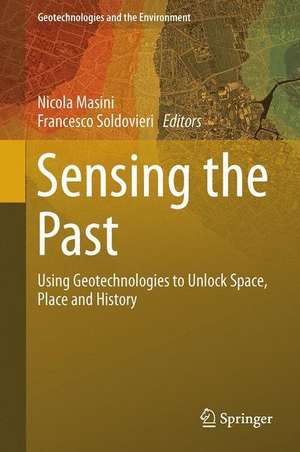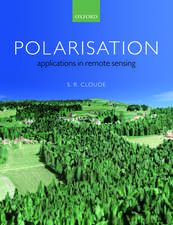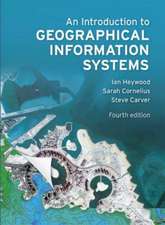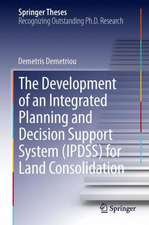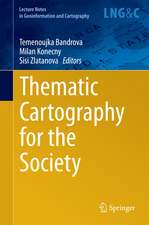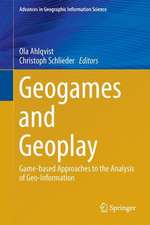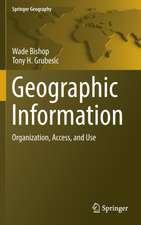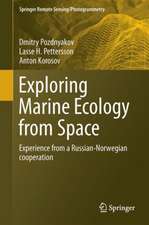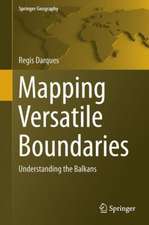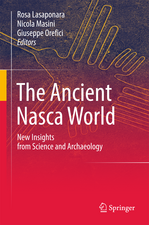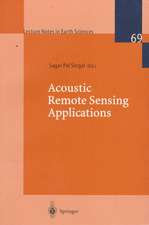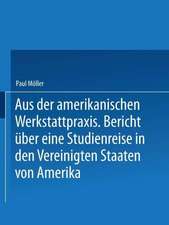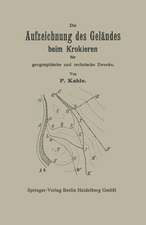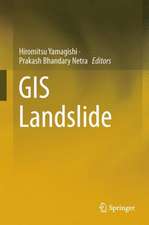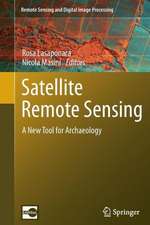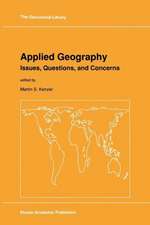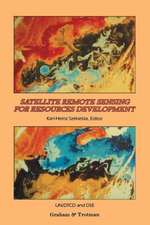Sensing the Past: From artifact to historical site: Geotechnologies and the Environment, cartea 16
Editat de Nicola Masini, Francesco Soldovierien Limba Engleză Hardback – 21 apr 2017
| Toate formatele și edițiile | Preț | Express |
|---|---|---|
| Paperback (1) | 1211.97 lei 38-44 zile | |
| Springer International Publishing – 21 iul 2018 | 1211.97 lei 38-44 zile | |
| Hardback (1) | 1408.89 lei 3-5 săpt. | |
| Springer International Publishing – 21 apr 2017 | 1408.89 lei 3-5 săpt. |
Din seria Geotechnologies and the Environment
- 15%
 Preț: 649.71 lei
Preț: 649.71 lei - 18%
 Preț: 1007.49 lei
Preț: 1007.49 lei - 18%
 Preț: 945.79 lei
Preț: 945.79 lei - 20%
 Preț: 566.51 lei
Preț: 566.51 lei - 18%
 Preț: 952.09 lei
Preț: 952.09 lei - 18%
 Preț: 948.92 lei
Preț: 948.92 lei - 15%
 Preț: 652.31 lei
Preț: 652.31 lei - 18%
 Preț: 951.77 lei
Preț: 951.77 lei - 15%
 Preț: 639.25 lei
Preț: 639.25 lei - 15%
 Preț: 652.17 lei
Preț: 652.17 lei - 24%
 Preț: 746.98 lei
Preț: 746.98 lei - 24%
 Preț: 778.71 lei
Preț: 778.71 lei - 18%
 Preț: 952.72 lei
Preț: 952.72 lei - 18%
 Preț: 968.34 lei
Preț: 968.34 lei - 24%
 Preț: 790.73 lei
Preț: 790.73 lei - 18%
 Preț: 995.63 lei
Preț: 995.63 lei - 18%
 Preț: 886.92 lei
Preț: 886.92 lei - 5%
 Preț: 1106.69 lei
Preț: 1106.69 lei - 18%
 Preț: 1215.04 lei
Preț: 1215.04 lei - 15%
 Preț: 636.12 lei
Preț: 636.12 lei - 18%
 Preț: 967.08 lei
Preț: 967.08 lei - 15%
 Preț: 530.42 lei
Preț: 530.42 lei
Preț: 1408.89 lei
Preț vechi: 1718.16 lei
-18% Nou
Puncte Express: 2113
Preț estimativ în valută:
269.59€ • 293.76$ • 227.17£
269.59€ • 293.76$ • 227.17£
Carte disponibilă
Livrare economică 02-16 aprilie
Preluare comenzi: 021 569.72.76
Specificații
ISBN-13: 9783319505169
ISBN-10: 3319505165
Pagini: 575
Ilustrații: XII, 593 p. 301 illus., 238 illus. in color.
Dimensiuni: 155 x 235 mm
Greutate: 1.24 kg
Ediția:1st ed. 2017
Editura: Springer International Publishing
Colecția Springer
Seria Geotechnologies and the Environment
Locul publicării:Cham, Switzerland
ISBN-10: 3319505165
Pagini: 575
Ilustrații: XII, 593 p. 301 illus., 238 illus. in color.
Dimensiuni: 155 x 235 mm
Greutate: 1.24 kg
Ediția:1st ed. 2017
Editura: Springer International Publishing
Colecția Springer
Seria Geotechnologies and the Environment
Locul publicării:Cham, Switzerland
Cuprins
Introduction: Cultural heritage sustainable management strategies and technologies.- Part I: Remote sensing and geophysics technologies, data analysis for applications in the field of archaeology and cultural heritage.- Optical satellite remote sensing for archaeology.- LiDAR for archaeological research and the study of historical landscapes.- SAR for landscape archaeology.- DinSAR for the monitoring of cultural heritage sites.- A window for the hidden past: revealing architecture remains based on ground spectroscopy data analysis.- Ground penetrating radar: technologies and data processing issues for applications in the field of cultural heritage.- Part II: In situ non invasive technologies for investigating monuments and artifacts.- Infrared thermography: from sensing principle to non destructive testing considerations.- Investigating surficial alterations of natural stone by ultrasonic surface measurements.- Hyperspectral sensors for the characterization of cultural heritage surfaces.- TeraHertz waves and cultural heritage: state-of-the-art and perspectives.- FF-XRF, XRD and PIXE for the non-destructive investigation of archaeological pigments.- Part III: ICT and sensing technologies for cultural heritage.- Wireless communication platforms for built and natural heritage monotoring.- Techniques for seamless color registration and mapping on dense 3D models.- Integration and analysis of sampled data: visualization techniques and platforms.- The reconstruction of archaeological contexts: a dialectical relationship between historical-aesthetic values and principles of building construction.- Technologies for visual localization and augmented reality in smart cities.- RFID sensors and artifact tracking.- Part IV: From artifact to historical sites: case studies and applications.- Detection of Maya ruins by LiDAR: applications, case study and issues.- Ultrasonic analysis of the Spanish cultural heritage: six case studies.- Wireless monitoring to detect decay factors innatural heritage scenarios in Spain: a case study at Lanzarote.- Integrated monitoring at a modern architectural masterpiece: the case of Viaduct Basento in Potenza.- Case study regarding the applications of THz imaging to cultural heritages.- A case study in Japan.- Uncovering Luoyang by remote sensing.- Integrated non invasive investigations on archaeological masonry structures: the case of Regio VIII in Pompeii.
Textul de pe ultima copertă
This book provides a complete overview of novel and state of art sensing technologies and geotechnologies relevant to support management and conservation of CH sites, monuments and works of art. The book is organized in an introduction stating the motivations and presenting the overall content of the volume and four parts. The first part focuses on remote sensing and geophysics for the study of human past and cultural heritage at site scale and as element of the surrounding territory. The second part presents an overview of non invasive technologies for investigating monuments and works of art. The third part presents the new opportunities of ICT for an improved and safe cultural heritage fruition, from the virtual and augmented reality of historical context to artifact tracking. Finally, the forth part presents a significant worldwide set of success cases of the exploitation of the integration of geotechnologies in archeology and architectural heritage management.
This book is of interest to researchers, experts of heritage science, archaeologists, students, conservators and other professionals of cultural heritage.
Caracteristici
Surveys application of geotechnologies and sensing technologies to cultural heritage and monument conservation Presents case studies carried out in Europe, Africa, the Americas and Asia Overview of the state-of-the-art technologies applicable to cultural heritage management and sustainability
